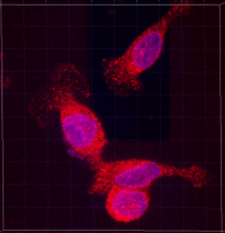Study in mice shows that an aggressive type of breast cancer is linked to an inflammatory protein
- Posted:
240-760-6600
Aberrant expression of an inflammatory protein, nitric oxide synthase 2 (NOS2), may enhance the progression and metastasis of an aggressive and less common form of breast cancer, known as the estrogen receptor-negative type of disease. In this work, NCI scientists used tumor xenografts (human tumor cells transplanted into mice) to mimic an aggressive tumor microenvironment that included inflammation, nutrient deprivation and hypoxia (inadequate oxygen in body tissue). The researchers hope that a better understanding of how NOS2 influences estrogen receptor-negative breast cancer tumor expression will lead to an approach, when coupled with drug inhibition of NOS2, that could provide evidence to clearly determine whether NOS2 has an important role in breast cancer disease progression in women.
The study by David A. Wink, Ph.D., head of the Molecular Mechanisms Section, Radiation Biology Branch at NCI, and his colleagues appeared April 14, 2014, in PNAS. Their experiments showed that estrogen receptor-negative tumor growth in mice was abated when NOS2 was inhibited. Their work also determined that predictive biomarkers found in highly expressed NOS2 estrogen receptor-negative human tumors were expressed at lower levels in the presence of the NOS2 inhibitor in mice. As a next step, Wink plans to develop patient-based models for inflammation and estrogen receptor-negative breast cancer. He also notes that this research could translate to other cancers, as aberrantly high NOS2 expression has been found in a variety of human cancers such as melanoma, lung, colon, gastric, prostate, glioma and liver cancer. NOS2 has also been linked to poor outcome (disease progression) in melanoma, pancreatic cancer and glioma.
